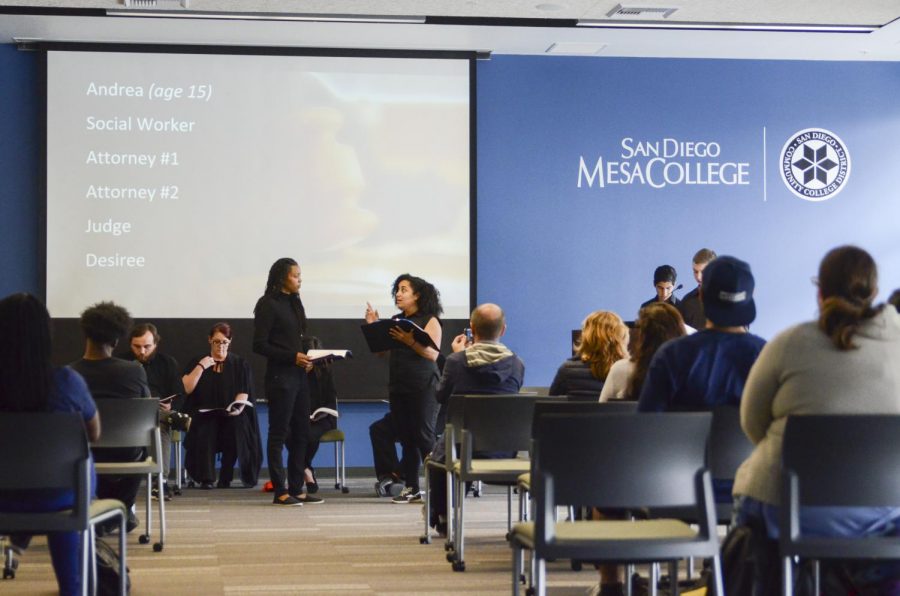Foster Care Awareness Week, presented by FAST Scholars- a program dedicated to serving and helping current and former foster youth get through college, took place at San Diego Mesa College March 19-22. The week wrapped up with a play, “Sisters in the System,” put on by California State University San Marcos and Palomar theatre students.
The play depicted what many foster youth go through, from attending court hearings, being moved to different homes, and being separated from family members. Writer of the play, Tori Rice, explained how the play came about, “I interviewed current and former foster youth, birth parents, foster parents, CASA’s, [Court Appointed Special Advocates] judges, and then I took all of their interviews and started crafting the story.”
“Sisters in the System” was in the form of a reading, so actors had scripts in their hands, but this did not stop them from bringing these characters to life.
From the start of the play, it was very interactive. As people took their seats, they were given programs, either yellow or blue, and when the play began, they were told to sit on one side of the room if they had a blue program and to sit on the other if they had a yellow one. This was an effort to force people to move and separate from their party, something that many foster youth have to go through. Actors also appeared from the audience and some read from the sides of the room, contributing to the interactive feel of the play.
There were a few moments in the play that really got at the audience’s emotion. One scene illustrated a fourteen-year-old foster girl with her foster dad driving home. The girl is hopeful and looking forward to going to a home, after being in a juvenile detention center for quite some time. However, her foster dad has other ideas on his mind as he tries to sexually assault her in the car. As the actors portrayed this scene, the audience went quiet and there was a sense of shame for the foster dad, and sympathy for the foster girl.
Another scene that pulled at the audience’s emotion in a rather light-hearted way was when the actors depicted what it’s really like at a court hearing. This scene involved a judge, attorney, and social worker determining the fate of a foster girl. Instead of saying actual words, the actors who played the judge, attorney, and social worker kept saying, literally, “blah, blah, blah” to show how no one ever really knows what’s being said in these hearings, let alone the child, and how it’s basically all a bunch of “blah.” This got several laughs from the audience and again, showed the reality of the foster system in a humorous way.
One audience member and student, Robert Pinsk, said he “thought [the play] was pretty interesting because it brought light to the issues that people have to deal with in the foster system.”
The purpose of this play was to highlight the difficulties that come with being in the foster system and bring awareness of how broken the system really is. Director of the play, Ingrid Trovão, shared what she hopes to bring with this play. “I see what I do as a vessel, that [gives us an] opportunity to have a dialogue…to perhaps brainstorm the reform that has to happen. Theatre has this cathartic moment, you see this frustration and you feel it. The bigger goal, for me, as a director is to engage in that conversation and start talking about [our] resources” Trovão said.
Though this play depicted the tough reality the youth has to go through in the foster system, it was a chance to gain some awareness and also learn more about Mesa’s FAST Scholars program that is doing everything they can to “close the hole,” as coordinator of the program Sade Burrell said, and provide a sense of togetherness and belonging.




